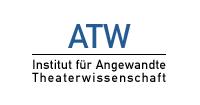Institute for Applied Theater Studies
The Institute for Applied Theater Studies is a training center for theater and performance at the Justus Liebig University in Giessen .
Course offer
There are currently a total of three courses, a bachelor's degree in applied theater studies , a master's degree in applied theater studies and the master's degree in choreography and performance, which is taught in English (cooperation degree with the Frankfurt University of Music and Performing Arts ). All three courses combine theoretical studies with artistic training.
The institute is a member of the Hessian Theater Academy (HTA, Frankfurt am Main). The systematic promotion of the HTA results in numerous collaborations between the courses in Applied Theater Studies (BA, MA), the MA Choreography and Performance and the neighboring universities (University of Music and Performing Arts, University of Design Offenbach am Main, Goethe- University of Frankfurt am Main).
Institute
Founded in 1982 by the Polish-German theater scholar and critic Andrzej Wirth , the Institute for Applied Theater Studies is part of the Justus Liebig University in Giessen. From the very beginning, the Institute for Applied Theater Studies was designed as a training facility dedicated to the theoretical as well as artistic and practical studies of theater and performance art. All three courses are structured in such a way that they offer students the widest possible range of courses. For the theoretical study, this includes the mandatory participation in so-called modular subjects, which means related social and humanities institutes at the Justus Liebig University.
In this form, the institute was a novelty in German-speaking countries, as it was decidedly an alternative to traditional, practical theater training at theater academies, but also knew how to differentiate itself from an exclusively theoretical study of theater studies. Through the critical relocation of a theater that has broken away from the (production) aesthetics and practice of traditional city theater, the institute has also become a fixture in the independent theater scene, which has grown rapidly over the last few decades.
In terms of content, the institute provides the ideal background for systematic research and testing of a constantly changing concept of theater. Theater as a place of aesthetic experience requires thinking about body, voice, language, space or perception to the same extent. The students are asked to deal with the very different forms of theater and to put them to the test again and again as part of their own theoretical occupation and artistic practice - also in a proverbial way.
In addition to Andrzej Wirth, it was above all Hans-Thies Lehmann who, in his theater studies studies on newer forms of theater, should sharpen the profile of the still young institute for many years to come. In 1999, Heiner Goebbels took over the artistic professorship . The theoretical professorship was held by Helga Finter from 1991 to 2011, and Gerald Siegmund has held the professorship since 2012 . In 2012, the Slovenian philosopher and dramaturge Bojana Kunst was won over for the professorship for dance studies and head of the choreography and performance course.
In addition, the range of courses is supplemented by the visiting professorship that is newly filled every semester. Well -known artists and theorists such as Marina Abramović , Heiner Müller , George Tabori , Emma Lew Thomas, John Jerusun, Samuel Weber , Diedrich Diederichsen , Marten Spangberg, VA Wölfl , Chris Kondek, Dietmar Dath , Antonia Baehr, Richard Schechner have already taught in Gießen , Patrice Pavis, Josette Feral, Robert Wilson , Richard Foreman , Georg Seeßlen , Mathilde Monnier , Jérôme Bel , Xavier Le Roy, Rabih Mroué , Tino Sehgal , Claudia Bosse or Walid Raad .
Graduates of the institute
Applied theater studies graduates then work in various fields. In festival or theater management, in publishing houses and cultural authorities, in the field of sound or video design, in dramatic writing, in science and in artistic practice. The well-known graduates include theater collectives in particular, but also directors, theorists and choreographers, including:
Assignment: Lorey, Rimini Protokoll , She She Pop , René Pollesch , Hofmann & Lindholm, Showcase Beat Le Mot, Gob Squad , Miriam Dreysse, also Hans-Werner Kroesinger , Helena Waldmann , Moritz Rinke , Tim Staffel, Till Müller-Klug, Arnd Wesemann, Wolf-Dieter Ernst , Kerstin Evert, Susanne Foellmer, Herbordt / Mohren, Bastian Kraft, Florian Malzacher , Bettina Masuch, Patrick Primavesi, Jochen Roller, Markus Wessendorf, Isa Wortelkamp, Jens Roselt, Annemarie Matzke, André Eiermann and Jörn Etzold.
Numerous premieres of graduate theses took place in the Mousonturm in Frankfurt am Main .
Web links
- Institute for Applied Theater Studies
- The book of applied theater studies , ed. by Annemarie Matzke, Christel Weiler and Isa Wortelkamp, Alexander Verlag Berlin, 2012
